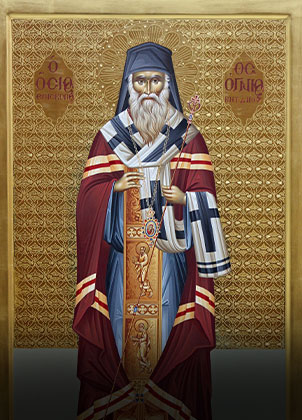In the name of the Father and of the Son and of the Holy Spirit.
Brothers and sisters,
Today, in the epistle reading of Sunday before the Exaltation of the Cross, we heard the following words of Holy Apostle Paul:
“God forbid that I should boast except in the cross of our Lord Jesus Christ, by whom the world has been crucified to me, and I to the world.” (Gal. 6)
The Apostle considered the cross of Christ his glory and object of boasting, even though at that time crucifixion was considered a most shameful and disgraceful way to die. Crucifixion was used only for executing slaves and the notorious criminals, the enemies of the state.
How does the Cross of Christ constitute our glory? – St John Chrysostom answers: “The cross is my glory, because for my sake Christ took the likeness of a slave and endured suffering, – for the sake of me, who was a slave, hostile and unthankful. He loved me so much that He delivered Himself up to death. What can be found equal to this? This is our boast that our Master, the true God, for our sake was not ashamed to suffer death on the Cross.”
“By the Cross of Christ the world has been crucified to me, and I to the world” (Gal. 6) – says the Apostle. What does this mean?
In the Holy Scripture “the world” may be used with different meaning. Here “the world” means everything, which is considered attractive and pleasant, like: wealth, honour, enjoyment: all those things which people in the world strive and compete for.
The Apostle is saying, as it were: ‘The destiny of my Lord was the cross, and not pleasure and comfort, therefore all these things, which are sought after, have died for me through the cross of Christ.’
“By the Cross of Christ the world has been crucified to me, and I to the world”
Having said “the world has been crucified to me”, St Paul also adds: “And I to the world”, i.e. I have been crucified to the world.
What is the difference between these two expressions of the Apostle: “the world is crucified to me” and “I am crucified to the world”?
‘The world has been crucified to me’, means that I have rejected and left behind all what is appealing in the world. Then, ‘I have crucified myself to the world’ means that in my heart there is no more interest or desire for all these worldly attractions. They have died for me, and I have died for them.
In such a way the Apostle depicts the Christian attitude, which is opposite to the attitude, which can be expressed with the phrase “enjoy life”.
We, as Christians, by all means should avoid the contemporary world philosophy of “enjoying life”. The Apostle names the adherents of this philosophy “enemies of Christ’s Cross” (Phil. 3).
However, hedonistic philosophy is not only foreign to the spirit of Christianity, it is simply false and lacks understanding of the nature of life.
Our life does not consist of enjoyments, but rather of labour and patience. Such was God’s Providence about man, as He said to Adam: “Cursed is the ground for your sake; in pain you shall eat of it all the days of your life” (Gen. 3)
The Lord doesn’t want us to stay for long without affliction, because in favourable circumstances our soul starts to produce thorns of passions, and especially pride.
Our life is filled with sorrows, great or small. When one affliction goes away, another one soon comes in its place. If they don’t pierce our heart like nails, then they prick like needles. Even little children are not exempt from this law.
Joy and sorrow are mixed in our life and replace each other like a storm replaces good weather.
Labour and suffering make us stronger; this is, so to speak, a nutritious food for our soul, while enjoyment is like a treat. As is due for us as Christians, let us see value, joy and meaning of our life not in worldly enjoyment, but in our ministry to our neighbours.
Amen.









